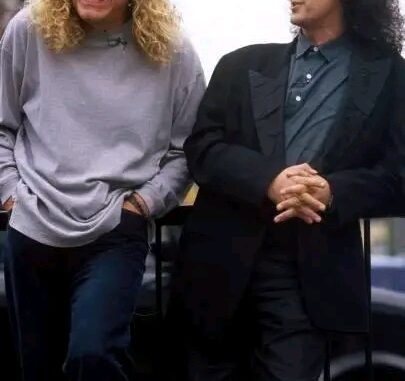
The early to mid 1970s marked the peak of Plant’s career with Zeppelin, but his life was touched by tragedy in 1977 with the death of his young son, Karac. This loss left a profound impact on him and influenced his later music, especially on his solo projects. In 1980, Led Zeppelin disbanded after the death of drummer John Bonham, and Plant pursued a solo career that spanned many different styles, from the folk-inspired “Pictures at Eleven” (1982) to the more experimental and world-music-infused “Now and Zen” (1988)…
The 1970s were a defining decade for Robert Plant, the charismatic lead singer of Led Zeppelin. At the peak of his career, Plant became an iconic figure in rock history, known for his powerful vocals and striking stage presence. However, the latter part of the decade took a tragic turn, and Plant’s life was forever altered by a heartbreaking loss that reshaped both his personal and musical journey.
In 1977, Robert Plant suffered the untimely death of his son, Karac. The young boy’s passing had an immense impact on the musician, sending him into a period of deep grief and reflection. This tragedy cast a shadow over Plant’s world, both personally and professionally, and played a pivotal role in shaping his future music. While Led Zeppelin continued to ride the wave of their global success, Plant’s loss slowly began to influence his outlook on life and the direction of his career.
The sudden and tragic death of Led Zeppelin’s legendary drummer, John Bonham, in 1980 marked the end of an era for the band. Unable to continue without Bonham, Led Zeppelin disbanded, leaving fans and musicians alike in shock. This loss presented Plant with a crossroads — the end of the band’s era and the start of a new chapter in his musical journey. Rather than retreat into solitude, Plant embraced the opportunity to strike out on his own and forge a solo career.
His first solo album, “Pictures at Eleven” (1982), introduced a more reflective, folk-inspired sound. While still anchored in his rock roots, Plant began to explore themes of personal grief and transformation, offering fans a glimpse into his evolving artistic vision. The album, though not as commercially successful as some of his earlier work with Led Zeppelin, laid the groundwork for his future projects.
By the late 1980s, Plant had fully embraced a more experimental approach to his music, melding rock with world music influences. His 1988 album, “Now and Zen,” was a sonic departure from his earlier solo work, featuring a rich blend of Eastern rhythms, synthesizers, and intricate melodies. The album’s single, “Heaven Knows,” became one of his biggest hits as a solo artist, proving that Plant could thrive on his own outside of Zeppelin’s shadow.
Throughout the 1990s and beyond, Robert Plant continued to evolve, collaborating with artists from diverse genres and exploring a wide range of musical influences. He embraced new sounds and experimentation, never allowing himself to be confined to any one genre or style. Albums like “Fate of Nations” (1993) showcased his willingness to delve into deeper, more introspective material, while his collaborations with Alison Krauss on “Raising Sand” (2007) brought a fresh, rootsy vibe to his catalog and earned him critical acclaim and multiple Grammy Awards.
Through it all, Robert Plant’s ability to adapt and reinvent himself has been a hallmark of his career. From the tragedy of losing his son to the death of Led Zeppelin, Plant’s resilience and artistic spirit have carried him through, shaping him into one of rock’s most enduring figures. His legacy as a musician remains unshaken, and his continued success as a solo artist proves that even after the most devastating losses, it’s possible to rise, reinvent, and thrive in new creative territories.
Leave a Reply